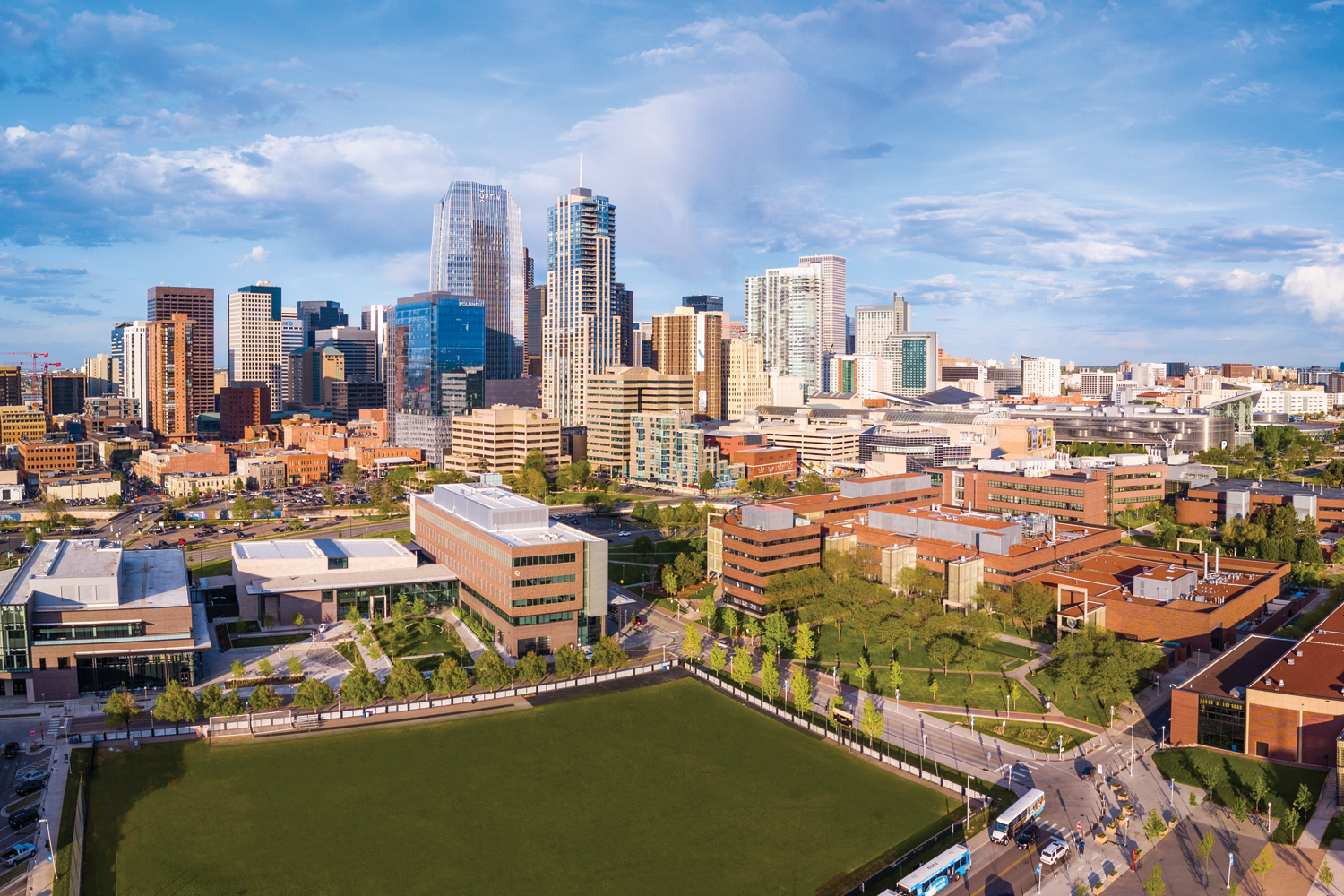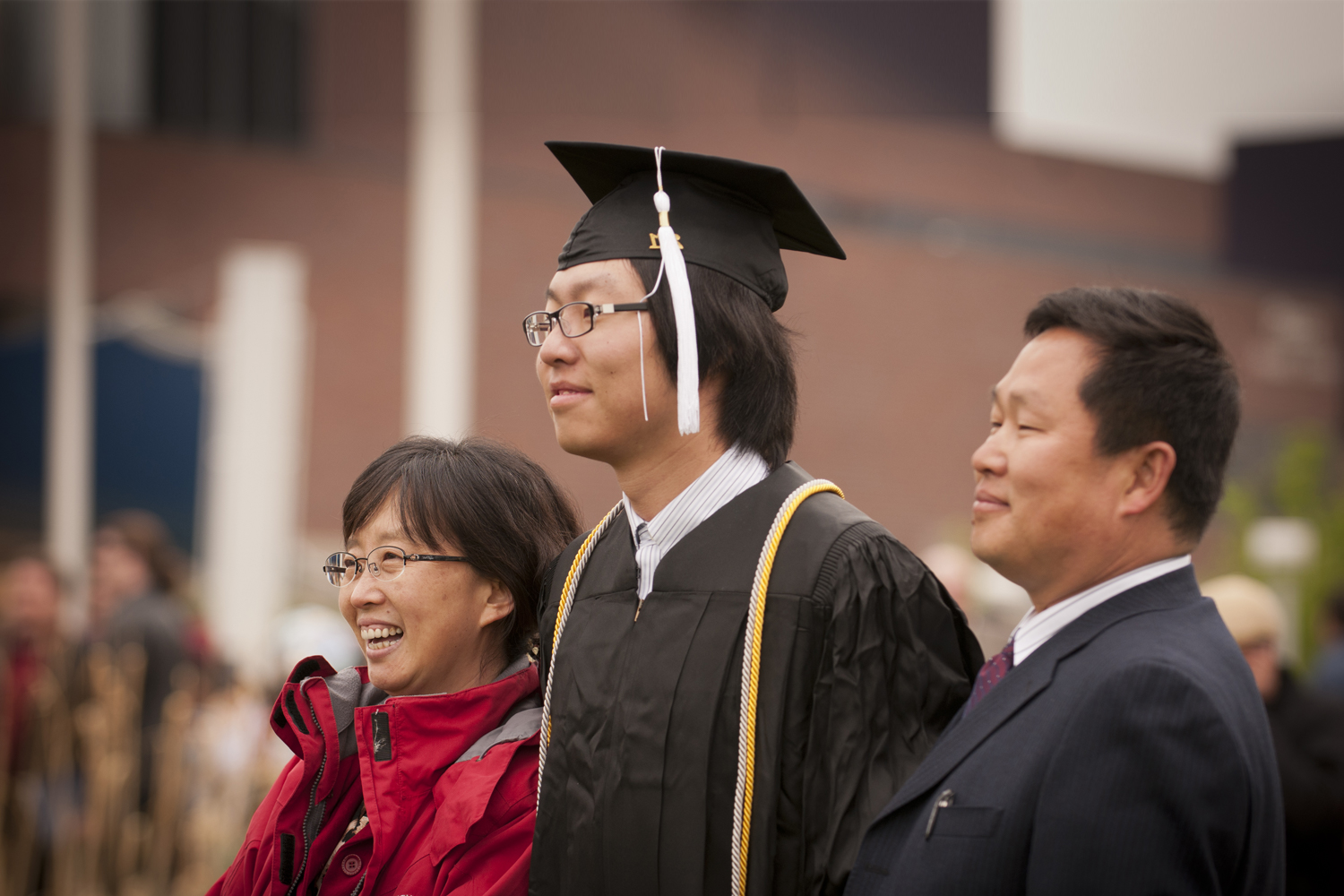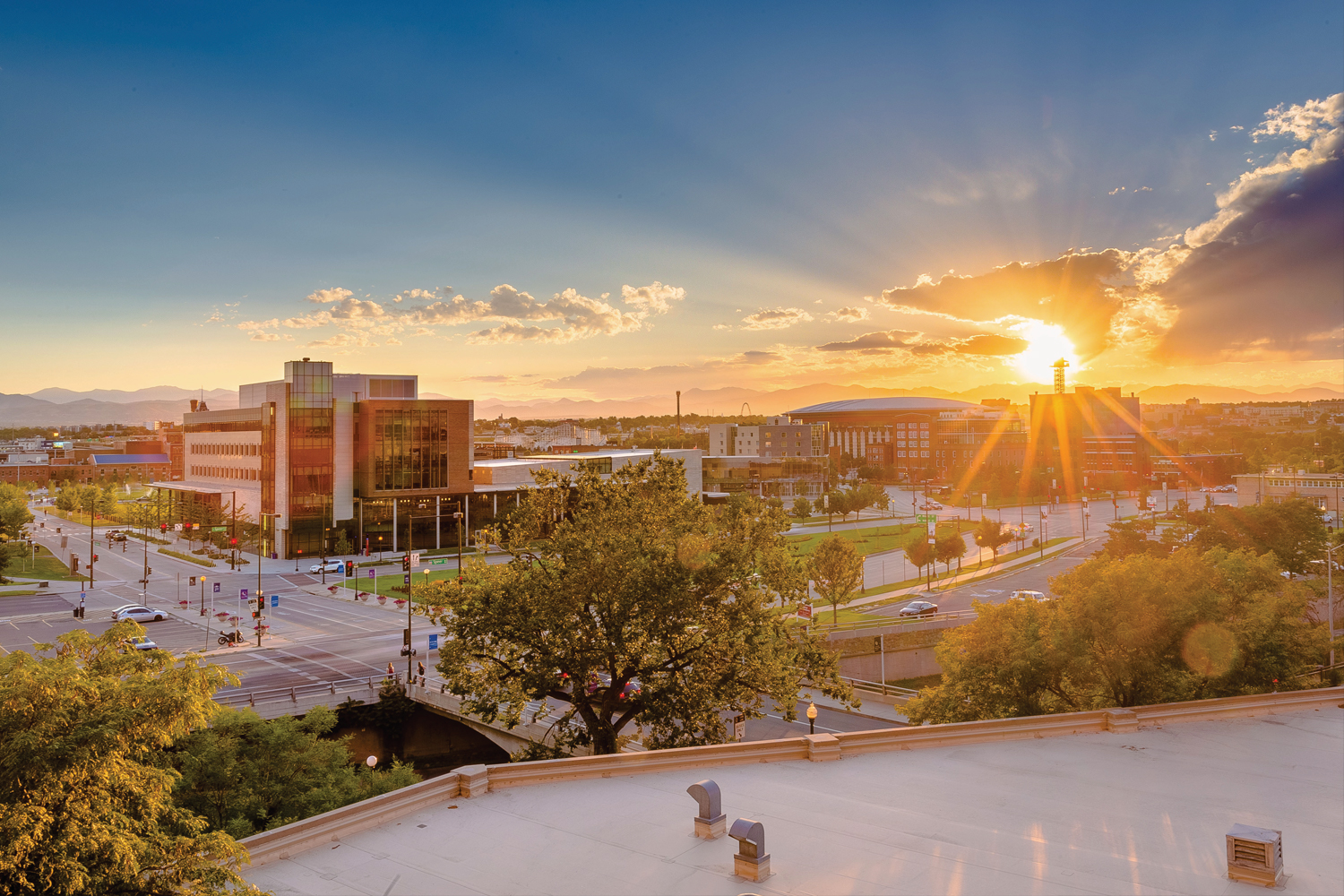Brazilian Scholars Get a “Kick” Out of CU Denver
More than 60 Brazilians, all top-flight students back home, enroll for a year of study in STEM programs
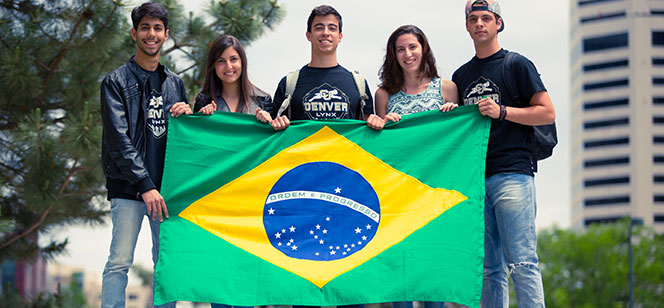
DENVER—Brazilians are renowned for their Carnival, their soccer and their zest for life. The country’s flair is on colorful display this summer as billions across the globe watch every bounce of the World Cup.
Here in Denver, meanwhile, dozens of Brazilian students are focusing on a different prize—enhancing their education. These young Brazilians—standout scholars in their country—look forward to plunging into classes at CU Denver, the Rocky Mountain region’s premier urban research university.
As many as 60 students will enroll at CU Denver this fall through the Brazil Scientific Mobility Program (BSMP). More than 50 of them are already here, taking English courses at CU Denver’s ESL (English as a Second Language) Academy on the 16th Street Mall. Another dozen or so are expected to arrive in August.
A YEAR OF STUDY IN STEM
The South American influx comes courtesy of the Brazilian government’s larger effort to grant 100,000 scholarships to the country’s best students to experience academics at the world’s top universities. The students—in their second, third or fourth year of university in Brazil—are here for a year of study in STEM programs—science, technology, engineering and mathematics—which are in abundance at CU Denver.
“For many of them, this is not only the first time leaving the country but the first time being away from mom and dad,” said Marcel Bolintiam, acting director of the ESL Academy.
Five of the Brazilian students sat down to talk about their experience so far: Guilherme Korol, computer engineering; Igor Dautas, architecture; Gustavo Presto, mechanical engineering; Jessica Mesquita, pharmacy; and Leticia Queiroz, civil engineering.
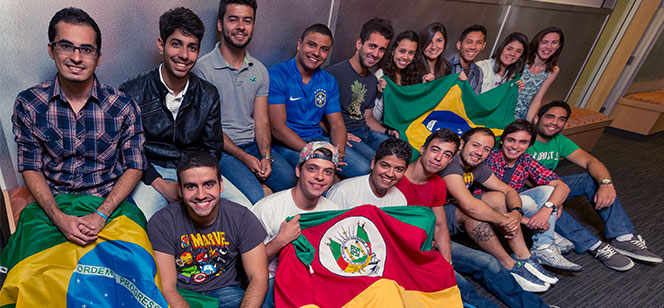
Brazilian students pose with their nation’s flags at the ESL Academy at the University of Colorado Denver. Photos by Trevr Merchant.
“Brazil is a country in development,” Mesquita said. “It needs a lot of employees in technological areas.”
Inflation has risen while the country grapples to find enough workers. Meanwhile, in the runup to the World Cup, large protests have become common, with demonstrators decrying government wastefulness and unfulfilled promises of economic growth.
The STEM education initiative, administered by the Institute for International Education (IIE), is a result of joint efforts from two sponsoring organizations: CAPES (Brazilian Ministry of Higher Education) and CNPq (Brazilian Ministry of Science and Technology). This funding partnership illustrates an education shift occurring in Brazil. “More than ever before, ” Bolintiam said, “there is a large number of first-generation Brazilians coming to the United States to study.”
The high-quality ESL Academy, coupled with the diversity of our student body, factored into Brazil’s decision to include CU Denver among the American universities of choice for its standout STEM students. “The ESL Academy fosters respect for cultural diversity, participation in American life and critical reflection, ” Bolintiam said. “The curriculum integrates English fluency, accuracy in written and oral expression, and content studies with the scholarly and interpersonal skills required to be a successful CU Denver student.”
The new arrivals are adjusting to Denver’s transportation system (raves), food (mixed reviews), and weather (snow!). In general, the city has surpassed their expectations.
‘I LIKE THE CITY … IT’S VERY BEAUTIFUL’
Queiroz listed Chicago as her first-choice for the program, but she’s glad she got Denver. “It’s amazing here. I like the city, the streets, the landscape. It’s very beautiful.”
Mesquita, who is studying pharmaceutical sciences in Brazil, expressly applied to the University of Colorado Denver | Anschutz Medical Campus because of its strength in health sciences. “It’s even better here than I expected,” she said. “I thought (Denver) would be like in the middle of nowhere, but it’s not. You have everything here. It’s all close to downtown.”
The students live in Regency Student Housing and get around on public transit. Presto observed that it’s good that the students aren’t in a city like Miami or Los Angeles, because then they’d be tempted to speak in their native language rather than be forced to practice English.
“We have a game,” Korol said. “Each time any of us are caught speaking Portuguese we have to put a quarter in a jar.”
The money will be used for a fun activity after the ESL classes are over. The group that arrived in March just finished an intensive three-week Maymester course in English. They’ve already experienced a lot of local entertainment: Nuggets, Rockies and Rapids games, bowling, nightclubs and museums. This summer, they look forward to seeing concerts at Red Rocks—Dautas has already bought tickets to several shows—as well as going camping in the Rockies. In May, an ESL specialist took several of the Brazilian students to the state Capitol where they met Gov. John Hickenlooper.
Dautas, who is studying to be an architect and enjoys creative design, gave high marks to the distinctive design of the Denver Art Museum.
LOOKING FORWARD TO THE VARIETY OF CLASSES
The Brazilians praised CU Denver’s emphasis on research, collaboration and integration of the city into the classroom. “In Brazil we study more theoretical things,” Dautas said. “I’m looking forward to the variety of classes I can take here. I think it’s important to see how students at other universities learn.”
Like CU Denver students, the South Americans already have end goals in mind—where they want to be, what they want to do. Bolintiam plans to take them around to the schools and colleges this summer so they can acclimate—and vice versa—ahead of fall classes. For example, several of the Brazilians are studying architecture and urban planning, so that will have an effect on the new undergraduate program in architecture in the College of Architecture and Planning.
“They’re probably one of the most motivated groups of students I’ve ever taught,” Bolintiam said. “These guys came in and have hit the ground running.”
The ESL Academy provides a rigorous curriculum that prepares international students for success at CU Denver. To accommodate the Brazilians the academy opened two extra sessions of English classes this summer. The ESL Academy, which opened in January 2012, and International Admissions both operate under the umbrella of the Office of International Affairs.
“This is impacting the university in a lot of good ways,” Bolintiam said of the Brazilian influx. “Since they are the top students in their own country, I can imagine that they’re going to be impressive in our classrooms.”
Led by Dautas’s creative flair, the group has already created a video, “One Month in Denver,” that captures the spirit and beauty of the Mile High City. Through social media interactions with friends back in Brazil, they are generating a positive buzz about Denver as well as their experiences with the ESL Academy and CU Denver.
The students are struck by Denver’s friendly, welcoming and trusting atmosphere. They feel safe in the city and look forward to their academic programs and making new friends during their first trip to the United States.
“I didn’t know about this university before, and now that I do I’m very glad,” Dautas said. “I’m very glad to be here—the city, the university. I’m very lucky.”
LEARN MORE
More information about the program can found at: http://www.iie.org/Programs/Brazil-Scientific-Mobility/About
Published: June 16, 2014
By Chris Casey | University Communications
Contact:christopher.casey@ucdenver.edu
UPDATES
International College Beijing
-
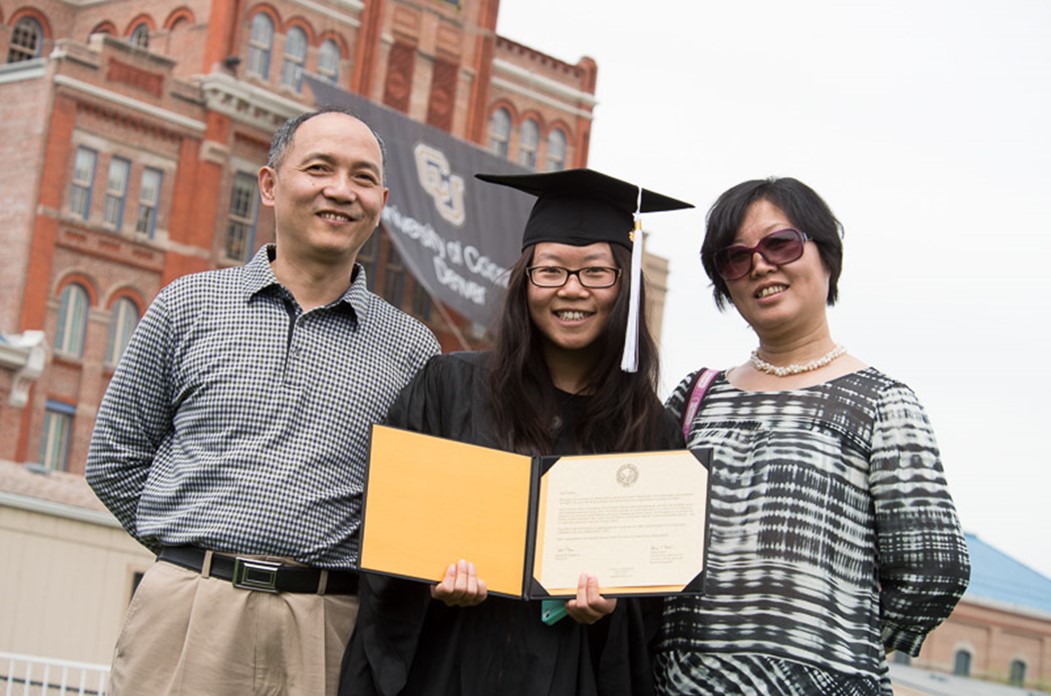
ICB Graduate Fellowship Provides Support
Oct 4, 2021The scholarship, which was launched eight years ago, provides $5,000 annually to an outstanding ICB student who chooses to pursue graduate studies at the University of Colorado Denver. A wide range of graduate programs are available, including applied mathematics, accounting, finance, risk management, public affairs, communications, economics, business, biostatistics, clinical science, and many other degree programs.Full story -
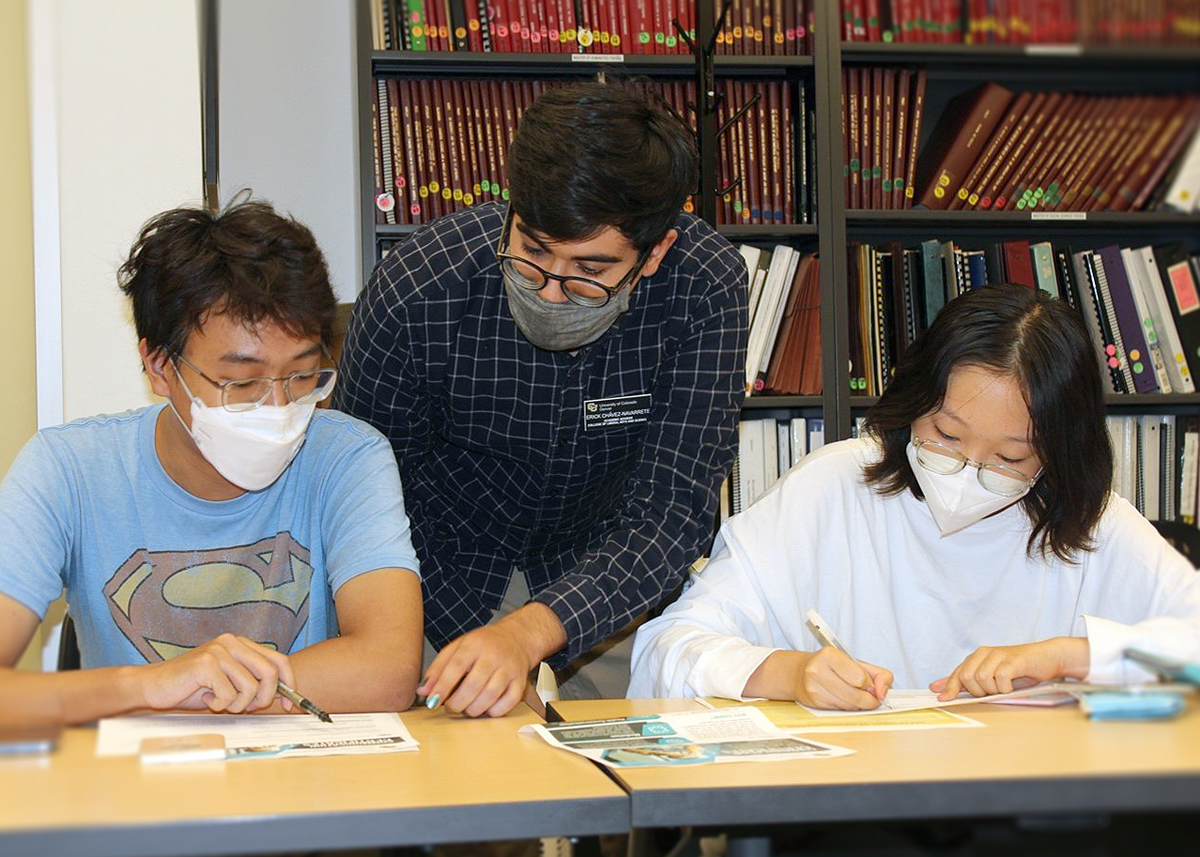
Personalized Attention
Sep 21, 2021Questions were answered, academic guidance was provided, and helpful facts were shared as CU Denver faculty and advisors met with ICB students who had recently arrived in Denver. The students gained a better understanding of certificate program options such as health communication and mediation. They also found out more about communication pathways , including global and intercultural communication.Full story
